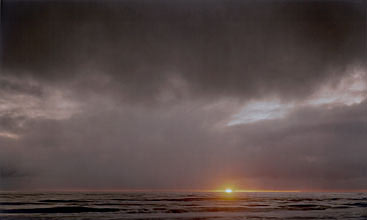
Born in 1969 in Paris (FR)
Lives and works in London (GB)

2001-2003
Colour photograph, digital print
180 x 300 cm
Year of Purchase: 2004
Towards Tomorrow (International Date Line, Alaska) #1 and #2, by Marine Hugonnier, are two imposing photographs. They are first of all a landscape, a snapshot, the sun setting behind the horizon of a calm sea and overcast sky. 180 cm by 300 cm, the distant water-line on which the sun gently flattens itself stretches out enough for the gaze to lose itself in it, so as actually to be in the landscape. A yellow light radiates across the space of the photograph, its source still visible on the first picture has disappeared on the second, as if asserting duration within the series. Despite its patent beauty, the work stands apart from the tradition of nascent impressions at sunrise, colour and feeling. It is the same subject, but the content is different. The title takes us off to an elsewhere, ‘Alaska’, ‘towards tomorrow’. Marine Hugonnier’s work has a confessed soft spot for landscapes, natural happenings, and it is in the Bering Straits, looking towards Siberia from Alaska, that she has caught this sun at nightfall. The place itself is the silent principal player in the picture and defines how it is to be read. The International Date Line was set by an international convention in 1884. The globe was divided up into time zones and this maritime frontier between Russia and the United States became something of an unreal space, opening up a 24-hour gap between the two adjoining territories. Catching the sunset over that line, the artist is therefore photographing the coming day. While pandering to convention, she contrives to realize that utopia of time travel, offering an unusual, complex-free view of the future. In so doing, Marine Hugonnier first overturns the certainties of this particular medium, for, as Roland Barthes writes, ‘in photography, this is a dual joint position: of reality and the past. And as this constraint exists only for photography, we have to take it to be […] the very essence, the noeme of Photography.’1 Turned towards tomorrow, the work actually contradicts the principle behind it.
But, beyond just the medium of photography, Towards Tomorrow insists primarily on this human conception of some universal time that goes against nature. Is tomorrow already here? Or, doesn’t the future exist? The future is improbable, time’s arrow has lost its sense of direction, north is now not the future but the present instant. At this precise point on the globe, ‘functional’ thought seems to have won out over a bankrupt imagination. The photographs of course take issue with this conception of universal time. ‘Homogeneous time’, that shared scientific and social notion, becomes obsolete and the inner perception of ‘duration’ as theorized by Bergson also appears as being no longer operative. The phenomenological experience of the world is eclipsed by what looks like the triumph of pragmatism. Through this specific questioning, the artist is pointing more generally to the gradual disappearance of the very principle of reality. For Baudrillard, the technical and scientific reaching towards perfection, completion and accomplishment of the world substitutes truth for illusion and thus helps to dissolve reality. Marine Hugonnier’s photographs tend to reveal this inevitable disintegration of the world by the rational act. The artist questions the way we apprehend the universe, and writes the well-known words of Baudrillard in what might be a comment on her work: ‘Reality does not disappear in the illusion, the illusion disappears in the fullness of reality.’2
Guillaume Mansart
1 Roland Barthes, Camera Lucida: Reflections on Photography, trans. Richard Howard, Hill and Wang, New York 1981.
2 Jean Baudrillard, The Perfect Crime, Verso, London, 1996.